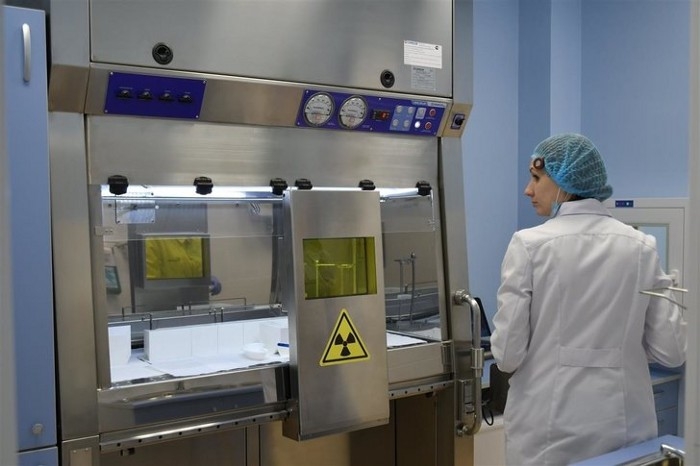Stanislav Samburskiy talked with Sergey Morozov, CEO of the Moscow Center of Diagnostics & Telemedicine, and Maxim Smolyarchuk, Deputy Chief Officer of Radiology and Instrumental Diagnostics for Radionuclide Diagnostics in Moscow.
Cancer patients will be examined at PET-centers in Moscow using a new radiopharmaceutical agent — fluorine-18-PSMA. Patients with recurrent prostate cancer after a radical treatment — surgery or radiation therapy — will undergo this diagnostic testing.
About 37,000 patients with prostate cancer are under the observation of Moscow doctors. Recurrence of cancer is identified in at least 30% of cases. Diagnostics is complicated by the fact that not all methods of diagnostic radiology detect new malignant cells at a low level of prostate-specific antigen (PSA). The lower the antigen level, the more difficult it is to detect malignant cells. Besides that, positron emission computed tomography is one of the most expensive methods of diagnostic radiology, which makes diagnostics not easily available for patients.
The state program of the city of Moscow for healthcare development has solved the problem and introduced the newest internationally recognized method of diagnostics to state budget-funded medical facilities. Moscow Positron Emission Tomography Centers have started using a new radiopharmaceutical agent based on the ultra-short-lived radioactive isotope fluorine-18 (fluorine-18-PSMA), which provides more opportunities for diagnostics. The study is being conducted within the framework of the Moscow territorial compulsory medical insurance program. It means that patients are diagnosed free of charge. Urologists and oncologists of city medical facilities and federal centers located in Moscow, refer patients for examination to PET-centers.
“Radiopharmaceuticals contain short-lived isotopes. With their help, specific molecules in the body’s cells are “highlighted,” and this is recorded by the detector of gamma cameras (scintigraphy) or positron emission tomography scanner. Based on the received information, oncologists can monitor how a malignant tumor ″responds″ to chemotherapy or radiotherapy, and adjust the treatment regimen in time,” — explained Sergey Morozov, CEO of the Center of Diagnostics and Telemedicine. “Radionuclide fluorine-18 can be produced in large quantities by cyclotrons installed in Moscow PET-centers. PET/CT scan with fluorine-18-PSMA is a new diagnostic test for Russia that helps detect metastases and foci of prostate cancer. In the past, for the sake of this examination, patients had to go to other cities and countries. This year in Moscow, up to 4,000 patients with prostate cancer can be examined by the end of 2020 “.
Positron emission computed tomography is used most often as a clarifying diagnostic method in patients who have already been diagnosed with cancer. The predominantly used fluoro-18-fluorodeoxyglucose (FDG), which is a biological analog of glucose, allows visualizing a large number of malignant tumors since they consume much more glucose than healthy tissues. However, prostate cancer is not one of those, so its spread cannot be determined using FDG. Therefore, an agent was developed that selectively absorbed by prostate cancer cells. Patients are injected with a radiopharmaceutical agent distributed throughout the body, and selectively deposited on prostate cancer cells like on targets. After that, the patient’s entire body is scanned.
“This technique allows visualizing malignant cells at the level of prostate-specific antigen (PSA) in the blood 0.2 nanograms per milliliter (> 0.2 ng/ml). At this level of laboratory parameters, oncologists recognize a relapse. Such characteristics of the agent are explained by the fact that its molecules are selectively deposited on receptors specific for prostate cancer. In the past, choline was used at PET-centers to diagnose a recurrence of prostate cancer. However, choline is considerably less sensitive; it identifies cancer at the antigen level of more than two nanograms per milliliter,” — said Maxim Smolyarchuk, Deputy Chief Officer of Radiology and Instrumental Diagnostics for Radionuclide Diagnostics in Moscow and the Central Federal District of Russia.
In the practice of other medical facilities, a radiopharmaceutical agent based on Gallium-68 isotope is used. Still, it is synthesized in minimal quantities and does not allow obtaining high-resolution images. Maksim Smolyarchuk emphasized that the new agent based on fluorine-18 allowed getting images of higher quality.
Note. The standard health insurance covers the cost of a study using fluoride-18-PSMA in a few countries — Russia, Germany, Denmark, Belgium, and Israel.
Читайте полный текст статьи на сайте S-samburskiy.medium.com


